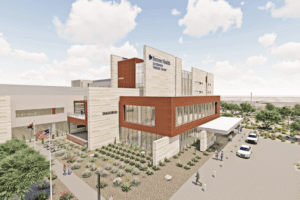The Western Region Public Health Training Center at the University of Arizona Mel and Enid Zuckerman College of Public Health has received a $4 million federal grant to improve the public health system in the United States.
The training center is one of 10 university-based regional public health training centers under the Public Health Learning Network. Each training center contributes expertise in particular skills-based training topics and subject areas. Together, they make up the nation’s most comprehensive source of public health training and support.
“More than 97,000 public health professionals have taken free courses through our training center since 2015,” said Douglas Taren, PhD, associate dean of academic programs and director of the Western Region Public Health Training Center. “We are responsible for 20 percent of all training within the Public Health Learning Network and we focus on the top public health issues today: childhood obesity, the opioid epidemic and mental health.”
As U.S. public health departments feel the strain of budget cuts, the training center fills the need for cost-effective continuing education and training programs for the public health workforce.
“The team of public health educators at the Western Region Public Health Training Center is focused on solving some of the most pressing public health issues facing our nation,” said UA President Robert C. Robbins, MD. “The Center is an incredible resource for health departments and community agencies throughout the United States, and I am excited by all the opportunities this grant will create. Improving and protecting the health of people here in Arizona and across the nation is an important part of our mission, and I am very proud the UA can serve our community like this.”
Abigail Stoica, associate director of the training center, says the services it provides helps health departments in Region 9 maintain accreditation and improve efficiency, among other services.
“We provide designated experts in the areas of nutrition, obesity and addiction. We also address emergency issues, such as the opioid epidemic and disaster preparedness,” Stoica said.
Webinar topics and self-paced training include: using mobile health apps to enhance nutrition intervention; prevention of diabetes and obesity in school-age children; medical complications of eating disorders; developing mediation skills for dispute resolution; programs for people dealing with homelessness; substance abuse and mental illness; mental health screening tools; postpartum weight retention and its connection to obesity and diabetes and more.
Many of the training courses are approved for continuing education credits for registered nurses, and continuing professional education units for registered dietitians and certified health education specialists at no cost to users.
“We will continue to assess the training needs of the public health workforce and create engaging, skill-based trainings to strengthen capacity to address the health disparities in Region 9,” Stoica said. “We have an amazing opportunity through expanded partnerships to create and share resources that better enable public health professionals to improve health in the communities we serve.”
The Western Region Public Health Training Center began as the Arizona Public Health Training Center, which was established in 2010 with a $3.2 million grant from the Health Resources and Services Administration, part of the U.S. Department of Health and Human Services.
In 2014, the center was given an additional $3.6 million to expand into a regional center providing free training and continuing education for the public health workforce in Region 9 of the Health Resources and Services Administration, which covers Arizona, California, Nevada, Hawaii and the Pacific Ocean islands that comprise the U.S. freely associated states. The most recent grant is a renewal of that funding.
Regional partners include the Hawaii Public Health Institute; Children’s Healthy Living Program at the University of Hawaii; Hawaii State Rural Health Association; School of Community Health Sciences at the University of Nevada, Reno; Health Officers Association of California; California Area Health Education Center at the University of California San Francisco; Pacific Island Health Officers Association; University of Arizona Southwest Telehealth Resource Center; Arizona Council of Health Service Providers; Eastern, Southeast and Northern Arizona Area Health Education Centers; and the National Network of Public Health Institutes.
To review the schedule for upcoming live webcasts and self-paced trainings, please visit the website at: www.wrphtc.arizona.edu




